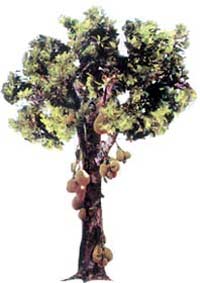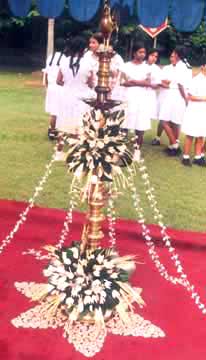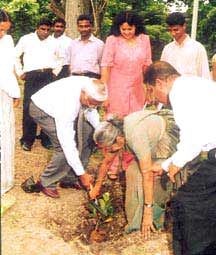Jak triumphs: The National Jak Development Project gets off the ground
|
|
|
|
|
|
by Vimukthi Fernando
Colombo: The Sunday Observer Sunday, 16 June 2002
"Opposites attract" goes the popular cliche. If anyone was looking for proof it was there at the BMICH on Tuesday, epitomed at various levels of contrasts. Bag-pipes and geta-bera to start with, government and opposition, academics and politicians, industrialists and environment activists, artistes and businessmen, auspicious times and computer technology - all for the love of the jak-fruit!
The occasion was the inauguration of the National Jak Development Project's (NJDP) jak planting campaign, but it was the incongruity of opposites coming together that held everyone spellbound, for a while at least. However, it wasn't the contrasts that held sway that day, but the humble jak-fruit or 'kos' as it is popularly known. Which, through humble origins and near oblivion was making a major come back to the 21st century dinner table.
The NJDP in launching such a scheme, was following the footsteps of one whom the Sri Lankan populace began calling 'Kos Mama' in jest. However, it was no joke for Reginald Stubbs then Governor of Ceylon, who patronised and contributed much to win favour for Kos Mama's campaign.
Nearly a century after the valiant efforts of the patriot and social reformer, Arthur V. Dias, to popularise jak-fruit, the ANCL lead jak planting campaign commemorated his endeavours, the planting of the first jak saplings in Dias' own garden on June 11, 1918.
It was "the stories about Arthur V. Dias, which inspired me to embark on such a project" said Bandula Padmakumara, President NJDP and Editorial Director, ANCL. The objectives are to popularise jak-fruit and related secondary products amongst the general public, to create an awareness of its nutritional and medicinal properties, to protect existing trees, to promote jak-fruit propagation - planting 100,000 saplings throughout the country, to promote export of jak-fruit related products, to provide 10,000 jobs for youth in the process and to establish a jak research institute.
And, it is "the national importance of the project which prompted ANCL to take it up and the presence and the support of the politicians from both the government as well as the opposition at the occasion is much valued" said Nalin Ladduwahetty, Chairman, ANCL.
"It is an example for the whole country specially for politicians to create a new political culture", agreed Karu Jayasuriya, Minister of Power and Energy, for "without the unity of the government and the opposition the 'tree' of the nation would not take root." The minister and the leader of the opposition were requested to plant one jak sapling together to symbolise the essence of unity.
After the planting it was time for jak-fruit treats. 'Waraka' and 'kirikos' were there to satisfy the tastebuds of those who planted jak saplings. It was to delight many, especially the who's who of Colombo society who showed no demureness about relishing the wonder of the wonderfruit. "It is my favourite. I'm happy to forgo rice if there is kirikos", said Malini Fonseka, the veteran film actress who has volunteered to support the campaign. "If at least the hunger of just one child could be satisfied through my efforts in supporting this campaign, that is enough for me" she said explaining why she joined the campaign.
|
|
"More than an economic tree, it is a lifegiving tree. Even if you plant one tree it will benefit numbers, bringing in a good psycological environment vital for life, in the first place. A campaign like this brings much gain not only environmentally, but in the psycological, social, political and economic arenas", said A. T. Ariyaratne, Chairman, Sarvodaya Sramadana Movement.
"In an environment of heavy de-forestation, this is a very welcome project exactly the kind people need at this time" said Prof. Edwin Ariyadasa explaining that it will help bring about the re-discovery of jak-fruit.
Amongst the jak-treats, jak-songs and jak-talk was also Prof. Edwin Ariyadasa's million dollar jak-question "Why is this fruit called jak-fruit?" Anyone with an answer?
| Living Heritage Trust ©2020 All Rights Reserved |


